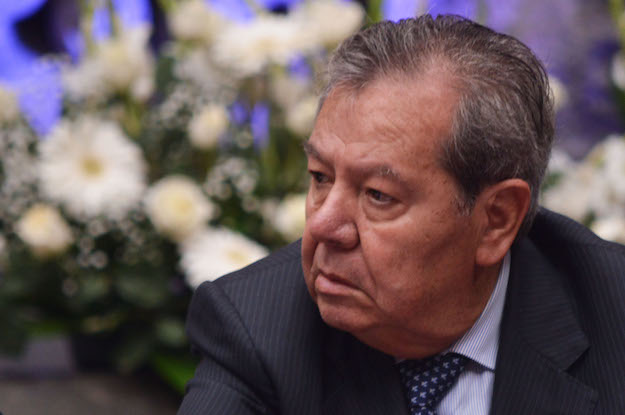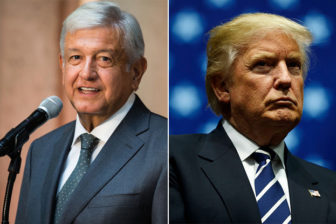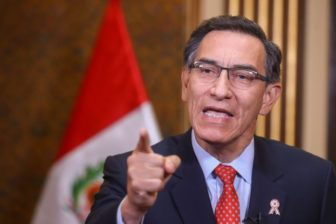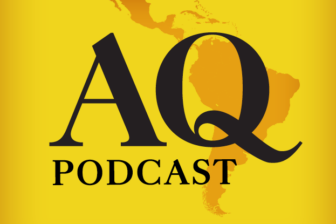MEXICO CITY – He has referred to his colleagues in President Andrés Manuel López Obrador’s Morena party as “servile” and “bootlickers.”
He was caught on a hot mic in 2019 slamming their performance: “F*cking hell, what a way to legislate.” (A loose translation.)
Now, at age 87, Porfirio Muñoz Ledo wants to be Morena’s next party chief – and drag López Obrador’s “fourth transformation of Mexico” back to its progressive roots.
“I can’t have political aspirations when I’m 90,” Muñoz Ledo told AQ in a recent interview. “But I won’t accept the party of the people becoming a party of money.”
Muñoz Ledo is a fixture of Mexico’s leftist politics, co-founding an opposition movement in the 1980s that became the PRD and later launched López Obrador on his first two presidential runs. Presiding over the lower house after AMLO’s successful election in 2018 with Morena, it was Muñoz Ledo who delivered the presidential sash at his inauguration.
But since that moment, Muñoz Ledo has diverged from his party and the president on immigration, the lack of a robust economic response to COVID-19, and much else in between. AMLO’s government, meanwhile, has to some been surprisingly conservative on issues like the environment and women’s rights.
Given his frequent and vocal misgivings about where the party is headed, Muñoz Ledo’s candidacy for Morena party president prompted one Twitter user to quip: “If he’s elected, what would you want (the opposition) for?”
Still, some observers believe Muñoz Ledo may have an edge in the leadership race. Amid coronavirus concerns, the vote will be held via a telephone survey of self-described Morena supporters starting later this month. There are more than 50 candidates for party president registered, though few if any have Muñoz Ledo’s name recognition.
At least some of the distance between the congressman and his party has its roots in the 2018 presidential election. The race left Morena and its allies with overwhelming majorities in Congress, but a rapid rise to political dominance has come at a price. The party is home to conviction politicians who have long supported López Obrador, but also to castoffs from the PRI and PAN, evangelicals from the Morena-aligned PES party, and opportunists of all political stripes.
“There are those of us who support the president from a historical position, a democratic and socialist position,” Muñoz Ledo said. “Then there are those who support him for their own interests.”
Muñoz Ledo has been sharply critical of AMLO’s deal with the U.S. to curb migration at Mexico’s southern border, and in February proposed a constitutional change to support undocumented immigrants (which received almost no support from his party). Where AMLO has hindered green energy development by canceling private sector auctions, Muñoz Ledo says the country should stop building new oil refineries and invest in renewables. The president often speaks in quasi-religious tones, while Muñoz Ledo is a vehement defender of the separation between church and state.
Despite such differences – and his frequently fiery rebukes of his Morena party mates – Muñoz Ledo presents himself as a “unity” candidate amid increasingly visible infighting. (This didn’t stop him from recently lobbing a demeaning barb at one of his rivals for the post.)
But should he win the leadership race, Muñoz Ledo will face an uphill battle in moving Morena in the direction he desires. Mid-term elections in 2021, the largest in Mexico’s history, offer little incentive for the president – or the rest of Morena – to pursue a clearer progressive agenda that might alienate potential supporters.
“Porfirio is concentrating on the finer points of building a party, when the priority for Morena right now may be to eat up as much political space as possible,” a close Muñoz Ledo aide told AQ. The congressman himself has conceded that the “fourth transformation” will take at least three presidential terms to implement.
Muñoz Ledo is nevertheless trying to speed that process along. In August, he and Morena Congresswoman Lorena Villavicencio launched what they call a “space for democratic exchange” inside the party, encouraging their colleagues to work toward their own agenda on women’s rights, social spending and more.
“We need to make the division of powers worth something,” Villavicencio told AQ. “It’s good that civil society is constantly demanding more of government, but we also need institutional checks and balances … one person alone shouldn’t be deciding the direction of the country.”
A battle with history
After more than five decades in public life, Muñoz Ledo’s past looms large. In the 1970s he was head of the PRI, the party that ruled Mexico as a big-tent hegemon for most of the 20th century. But he was also a key player in the transition to democracy, not only co-founding the PRD but also serving as the first opposition president of the lower house in 1997.
In 2000 Muñoz Ledo was briefly a presidential candidate before dropping out to support Vicente Fox, a PAN governor who then won the election. In return, Muñoz Ledo was tasked under Fox with organizing the “state reform” plan, a wholesale modernization of Mexican government that included steps to strengthen Congress’ oversight of the presidency.
The plan never came to fruition. Muñoz Ledo told AQ that the rationale for supporting Fox was “to change the direction of the country,” but many of the issues he was fighting for at the time – such as the need to draft a new constitution – remain priorities today.
“He has his ideas about how to renew the Mexican political system and he’s been consistent,” Gustavo Almaraz Montaño, a former PRI senator who served opposite Muñoz Ledo, told AQ. “But he’s never been in agreement with the group in power.”
Some see echoes of Muñoz Ledo’s break with the PRI in his current efforts to get Morena to change course. But the congressman, who has been a staunch supporter of López Obrador since at least his first presidential run in 2006, says that any reports of rupture with Morena or AMLO “could not be further from the truth.”
“The president tries as much as possible to be faithful to the ideas that brought him to power, but he also at times makes strategic concessions,” Muñoz Ledo said. “He picks his battles.”
Muñoz Ledo, by contrast, appears to take them all on. He has served as secretary of labor and of education, been ambassador to the EU and the UN, a senator, a congressman and the president of (so far) two different political parties. Even so, his most consequential fight may still lie ahead.
“I’m certain – absolutely certain – that Andrés Manuel will do as he says and go back to his ranch when his term is over in 2024,” Muñoz Ledo said, referring to speculation in some quarters that the president might try to ignore a ban on re-election. “So the question is this: Who gets the future?”








